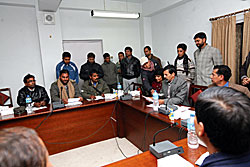 DOTTED LINE: Representatives of armed group TSJP's Prashant, coordinator Gajendra Kumar Mandal 'Anurag' and Pralhad sign a five-point agreement with Minister of Peace and Reconstruction, Janardan Sharma on Wednesday. The government agreed to treat the TSJP as a political party. |
A dangerous polarisation is happening. On one side are the Maoists and their affiliated front organisations. The party machinery has firmer control on marginalised segments due to clever policy measures, on sections of the elite with backroom deals, and on the bureaucracy by co-option or coercion. A segment of the UML is complicit in the Maoist project of consolidating its strength by all means.
On the other side, there is the NC displaying a rare coherence in its uniformly anti-Maoist stand. A crucial faction of the UML wants to distance itself from the present regime. This broad front will be backed by a section of the business and media savvy elite, the landed in the districts, and the RPP-RJP types. Other Madhesi parties may come on board.
The army top brass is playing both sides, building a better working relationship with the Maoists yet deeply suspicious of them. Top army generals are understood to be telling the NC leaders to "become stronger" before it is too late, or else they will lose the "natural support" from the military.
The Maoists have also alienated many sections in India, including erstwhile supporters. Delhi is not necessarily orchestrating a new realignment but it has given up any hopes of getting consensus back and will be open to alternative formations.
The polarisation gained legitimacy after the attacks on the media last week, and an anti-Maoist mood is being created systematically. The only reason why this has not come to head right now is because there is no neat Plan B: ousting the government will mean chaos on the streets and an end to the constitution-writing process for now. Plus the contours of any opposition, especially the arithmetic, will remain unclear till the UML takes a call in its convention.
Let us engage in some crystal ball-gazing for 2009. It is unlikely that the government will last in its present form through its tenure. The polarisation will shrink the democratic space. Clashes between parties (NC-Maoist, UML-Maoist, between national and Madhesi parties, among Madhesi outfits along caste lines) may escalate and become more violent locally. Identity politics will become more assertive, especially among Tharus in the west, and perhaps among sections of Muslims besides the Limbuwan agitation.
The state will fail in delivering on either its security or welfare functions. This will erode its legitimacy, adding to the frustration among people and opening up the space to question this entire process. Impunity will be rampant. Madhesis will continue to be angry and disillusioned and the state-Madhes trust deficit will widen in a largely anarchic set-up. Local vigilantism will increase in the Tarai through armed groups and in the hills through youth wings of parties.
The CA and its committees will miss many of its deadlines. The federalism debate could spill out on the streets and it will be impossible to stitch a deal acceptable to all sides. The peace process may remain dormant, with little movement on integration and justice. The discontent within the Maoists will intensify and the leadership will have a tough time reconciling interests. With a possibly different political formation in Delhi after the April elections, India may not be as soft and supportive of this process.
The army will become stronger, and will remain autonomous of civilian control in key respects. There may be a greater diversity of voices among the top brass but most key political developments will have the involvement of the military, though from behind the scenes.
The economy will face the impact of the global recession, as remittances and aid dip. Unemployment will increase. Key infrastructure and hydroprojects will be blocked because of instability. Conflicts around land issues will increase, even as agriculture will remain stagnant.
Wishing a happy new year in these dark times would be stretching it but Nepal often comes back from the brink. To paraphrase the Indian thinker Ashis Nandy: here is hoping that the chaos is manageable and not unmanageable, the anarchy is humane and not inhumane, and the disorder is tolerable and not intolerable in the Nepal of 2009 .



